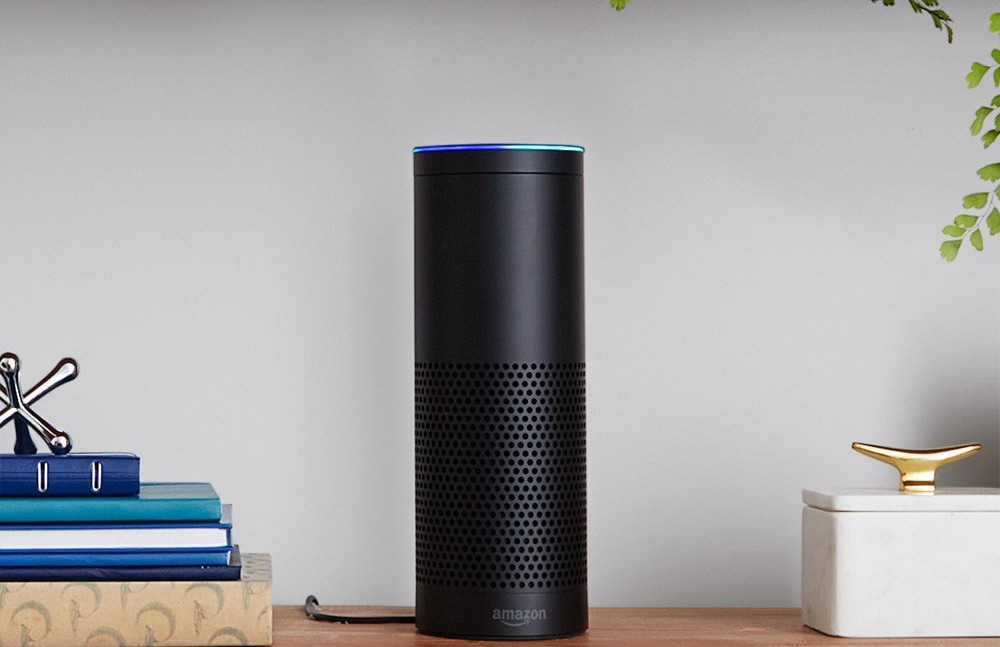Technology can often counterintuitively interfere with the writing process, which is probably why many writers love the simplicity of a typewriter or a paper and pen. You can’t Ctrl-T yourself a new tab and get lost in Facebook and memes if you’re working with Stone Age tech. And mobile devices can sap your creative juices or distract you with push notifications. But you don’t have to fear all technology and in fact there is some ubiquitous tech these days that every writer should get their hands on.
I’m talking about all these varieties of smart speakers with built-in voice assistants like Google Assistant and Amazon Alexa. Microsoft even has Cortana, I hear, but she’s probably better suited to helping you prevent an alien invasion for now.
In a previous post, I mentioned the Amazon Echo or Google Home devices as a great tool every writer should get, but they’re so useful and versatile, they really warrant their own article explaining the many ways a writer can use them to assist with the craft. So let’s take a look at some ways you should be using your artificial intelligence companion, and if you don’t have one yet, order one today!
Setting Writing Timers
Procrastination is a writer’s greatest enemy, but a Google Home or Amazon Echo can help you win the fight by making it easy to set aside time to write. You’ll find a lot of writing advice out there suggesting to set aside an hour a day or whatever period of time however frequently works for you to devote strictly to writing. But watching the clock can be a huge energy drain as well as a distraction.
So instead of sitting in front of the blank page on your computer screen constantly glancing down at the clock to see if you can go play Stardew Valley yet, leave the timing up to your smart speaker.
This takes the onus of watching the clock off of you so you can focus on the writing.
Hey, Google. Set a timer for one hour.
Setting a timer is one of the simplest tasks these devices can do and people use them all the time for cooking, laundry and so much more. As a writer, you should put this tool to use. Of course, it’s nothing a simple timer app or alarm clock can’t accomplish, but smart devices can do that and so much more! Just keep reading.
Get Quick Facts and Research
Writing often requires a lot of research, and sometimes having to take a break from writing to look something up can take you out of the zone or even lead you down a Wikipedia rabbit hole if you’re not careful. So rather than browsing the Web for the information you need, get the answers without having to leave your Word document.
Alexa, how tall is a horse?
Simple question voice commands like “Who was king of England in 1305?” can give you a quick answer. Even when you’re writing complete fiction, there will probably be some basic facts you might want to get right. Without these devices, your options are typically to leave a note for yourself to come back and fill out the accurate information or open a new tab and go find the answer. Both of course have their pitfalls. It’s easy to forget and you risk leaving inaccurate or incomplete information in a draft, and for some writers leaving an unanswered question hanging will gnaw at them making it difficult to continue writing as they keep thinking back to that question in need of an answer. And say you do go and research it, opening a new tab or leaving your page can easily pull you out of your writing flow and opens up a whole can of distracting worms to deal with along the way. You might just want to know whether or not mangos grow in Taiwan and end up reading a whole article about the Kuomintang.
Thankfully you can solve a lot of quick research needs with a smart speaker device. Just ask the question and get your answer so you can get back to writing.
Play Music That Fits the Mood
A lot of writers love to listen to music as they write. I personally suggest using music as a way to get you into the right mood for whatever you’re writing. Think about what music your characters would listen to or pick songs that help you feel the emotion of the scenes you hope to put to page.
Whatever your personal tastes, smart speakers are great at playing music, particularly Echo devices combined with a Prime Music membership. You get a wide range of songs included with a regular Amazon Prime membership, but you can upgrade to an Unlimited membership for access to even more.
Echo, play Def Leppard.
I’m sure Google devices play music somehow too, but I’m less familiar with them. I used to use Google Music back in the day, but that service has been discontinued. Still you can probably use YouTube Music, Spotify and other services through it.
Of course you can play music on your computer or other favorite devices too, but when writing I find the voice-activated controls helpful because I don’t even have to take my hands off the keyboard. Less distraction, less fuss.
Set Reminders for Yourself
Sometimes you have an interesting idea or thought, but aren’t ready to dive into it at that moment. Reminders can be a great way to tell your future self to check in on that topic later. Maybe you’re thinking Ireland would be a good location for the next book in your art heist series. Simply set a reminder for yourself to research Irish art museums tomorrow morning, or this weekend, whenever is convenient for you.
Alexa, remind me to research places to hide a dead body in Idaho tomorrow.
But those one-off ideas aren’t the only use for reminders. One of the most important skills for a writer to master is discipline, and you can also use reminders to help keep you on your writing schedule by setting reminders. It’s particularly useful to set recurring reminders to help you make writing part of your regular routine. Maybe you plan on writing for two hours every Saturday. Just hoping you remember, and have the will power to keep to it, is a risky strategy. Setting a recurring reminder for Saturday at a specific time will not only help you remember your commitment, but your smart assistant will sort of guilt you into following through.
Hey, Google. Remind me to work on my book every Saturday at 8:00 PM.
Look Up Definitions and Synonyms
Words are your most important tools as a writer, and while most people might think writers have some natural skill to know the perfect word for every situation, we all know that’s not the case. Writers often struggle for finding the right word, and there are sometimes words we don’t even know the meaning of.
Smart devices can give you the full benefits of a dictionary and thesaurus but with a lot more speed and ease of use. Sometimes you might have a word in mind but are worried about the nuance of its meaning. Will it work in this sentence? Well, just ask Alexa or Google what the word means.
Or if you have a very fine, but wholly unoriginal word in mind, and would like to spruce it up some, then you’ll want a thesaurus. Fortunately, you can ask your smart speakers to suggest synonyms for you. And if you find a good word this way, follow up by asking for its definition so you can make sure it’ll fit your need perfectly.
Alexa, what’s a synonym for failure?
Use Dictation to Save Notes
You never know when inspiration will strike, which is why it’s always good to have a way to take notes readily available. While voice dictation is still a bit spotty and difficult to use, it can make a great supplement for when your hands are tied. I’d still recommend a pen and paper or a mobile device as your main source of notetaking, but a smart speaker adds a layer of convenience in certain situations.
For example, maybe you don’t want to get out of bed. Just reading out your note to an Amazon or Google device will get it jotted down, maybe with a few typos, for you to check out in the morning. Or if you’re struck with a good idea while washing dishes or jogging on the treadmill, being able to use your voice to dictate to your thoughts is a big help.
Hey, Google. Take a note. Maybe I should wait to kill off Yesenia until after the divorce papers are served.
You probably will need to do some editing later and shouldn’t expect to write out your whole book in this way, but it can be a helpful tool to have available. And if you’re someone who prefers to dictate their writing, go for it.
Create Lists for Ideas
Every writer probably has a ton of lists. Lists of novel ideas. Lists of character names. Lists of cool ways to commit murder. It’s just one of many things writers have in common with sociopaths. Similar to taking notes, smart speakers can help keep track of lists, if you can remember what you name them.
Simply create a list for anything you want and when you have something to add, tell your device.
I find this particularly useful while writing because I can create a to-do list for going back to later. This way I don’t have to interrupt my writing to solve a particular problem or change something then and there. Save the editing for later. I’ll just add my thought to my “Edits” list and plow ahead with the writing. “Rework the third paragraph to be more tense.” “Give the old man character a name.” “Find out a good historical story for the main character to tell.”
Once I’m done writing I can go back to the list when I’m ready to edit.
Alexa, add Guybrush to my character names list.
You can create individual lists for different projects if you need, and it’s easy to access and organize them online with your phone or computer later. You can even have the devices read back your lists if you prefer, but I like to see them.
Those are just some examples of how you might use these smart devices to help you writing. If you have other tips, please drop them in the comments below. Everyone has their own personal preferences and style, but technology of all kinds is here to help.




